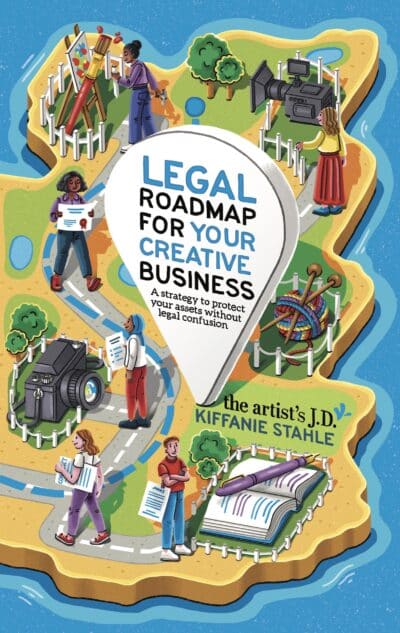Running a regular legal check-up of your creative business sounds boring. But it is critical if you want to build a strong foundation to support your big business goals.
And unless you turn it into a habit, it’s hard to change your pattern of behavior. (Pssst…my favorite book about habit forming is The Power of Habit by Charles Duhigg [affiliate link].)
You probably don’t have strong habits around performing a regular legal check-up of your creative business.
This is why in this post, I’m going to help you form this new habit. Each quarterly post outlines a set of legal tasks you should complete in your creative business that quarter. (You can see the Q1 tasks here, the Q2 tasks here, and the Q4 tasks here.)
In the third quarter, you’ll tackle between three and six legal tasks that should take you 20 minutes or less each.
These tasks are:
- check if you have all the required permits and licenses your business needs
- decide if it’s time to register your business name, logo, or any product/service names as trademarks with the USPTO
- pay your taxes
- if you are doing business under something other than your legal name (or your LLC/corporation’s legal name), get a Fictitious Business Name (FBN) or Doing Business As (DBA)
- if you have employees, update your employee manual
- if you are an LLC or corporation, document all major business decisions and hold any required meetings
#1. Check if you’ve got all the required permits and licenses
In most places, you need a business license just for the privilege of owning a business.
But you also might need a:
- seller’s permit
- home occupancy license
- fire permit
Based on your location and the type of business you are running, your requirements will vary. A good place to point you in the right direction is this directory from the Small Business Administration.
Additionally, many city and county websites have a section dedicated to small business owners. And this part of their website usually explains what you need to do to run a legit business within their borders.
Your assignment: Double-check that you are current and hold all the permits and licenses your business needs.
Here are two resources to help you out:
- This post not only helps you figure out what permits and licenses you might need, but gives you phone scripts that will help you ask the right questions (and call the right people) to quickly find answers.
- Don’t want to do the research yourself? You can hire me to figure this out for you.
Does your business have the required permits and licenses?

Did you know that a dba is only one of the government permits and licenses your creative business might need?
Inside my book, I’ll guide you step-by-step to feel confident that your business has the correct permits and licenses. The book also gives you a straightforward strategy to protect your ass(ets) without legal confusion. It’s the go-to guide you need to get all your legal ducks in a row.
(If you use the above Amazon affiliate link, I’ll make a small commission, but it doesn’t change the price you pay.)
#2. Make sure your public business name is the same as your legal business name
Sometimes you create a sub-brand of your business, which turns into the only name the public knows your business by.
This might be because you spin a product/membership/course into a website. This might be because you pivot.
So you need to figure out if the public thinks your business name is the same as your business’s actual legal name. How do you do this? Look at your:
- website URL
- website header
- invoices and what appears on their credit card statements
- email footers
- business cards
If the public doesn’t think your business name is the same as your business’s actual legal name, then you’ll need a Fictitious Business Name (FBN) or Doing Business As (DBA).
In this video, I break down examples of when you do (and don’t) need a DBA, plus share how to get it and why you should take the time to get it.
Your assignment: Apply for an FBN/DBA with your city/county for any required names. (Note: these statements are the same thing but have different names from place to place.)
#3. Decide if it’s time to trademark
You can register your trademark too early, and you can register it too late. But at least once a year, it’s a good time to evaluate if you are in the sweet spot to register any trademarks in your business.
Your assignment: Read this post to learn if you are within the registration sweet spot. If you are, make an appointment with a lawyer, because trademarks are one thing you should never DIY.
Your To-Do List is Long Enough—Let Me Handle the Legal Stuff
You’ve got a business to run, clients or customers to serve, social media to post, and creative projects to manage. The last thing you need is to spend hours digging through databases to see if your business name is legally safe. Instead of adding another headache to your list, let me take care of it.
Don’t risk rebranding later—let’s check your name now. Find Out How
#4. Pay your taxes
To make your annual tax time a little easier, each quarter you should pay your taxes. You might owe:
- estimated self-employment taxes to the IRS
- sales tax to your state tax agency
- employer’s taxes to the IRS and your state tax agency
Your assignment: Send checks to the appropriate agency (And if you don’t have a system to set aside the government’s money, I highly recommend Profit First by Mike Michalowicz [affiliate link].)
#5. Update your employee manual, if you have employees
Part of being a good boss is providing tools and resources for your employees. And one of these things is an employee manual that explains:
- how to do their jobs safely
- the rules surrounding their employment
- any benefits you provide
Twice a year, you should update your employee manual. You’ll update it based on situations that have come up or changes you have made to your business.
Maybe an employee forgot the social media password and changed it. And then when you tried to log in, you couldn’t. To make sure this doesn’t happen again, you’ll outline a system for updating and storing passwords.
Maybe you’ve decided to offer profit sharing to your employees. Because you believe this will incentivize good employees to stay or reward their investment in building your dream. Since this is a new benefit, you need to outline to your employees how it will work. You’ll tell them how profit is calculated, how profit will be distributed, and what happens if they leave.
Your assignment:
- If you have an employee manual: pull out your employee manual and update it
- If you don’t have an employee manual: open a blank Google Doc and start outlining how you expect your employees to behave
#6. Document all major business decisions, if you are an LLC or corporation
The whole reason you created your LLC was for three big benefits. And to keep your fence strong, you are required to document all major business decisions.
This might seem silly as a one-person show, but it shows that you are treating your business like a business. It fortifies your fence.
To document your decisions, you don’t need to do anything fancy. It can be as simple as summarizing notes from a meeting or writing down what your plan is. (In legalese, these are called Minutes of a Meeting and Written Consents.)
Your assignment, if you are a corporation:
- If you haven’t held your annual shareholder meeting and board of directors meeting, hold one
- Write down all the major decisions you’ve made in your business in the second quarter and add them to your central file
Your assignment, if you are an LLC: Write down all the major decisions you’ve made in your business in the second quarter and add them to your central file. (Don’t have a template for these? We’ve got one in the artist’s Courtyard.)
That’s a Wrap!
In July, there are between three and six legal tasks you should tackle to legally maintain your creative business:
- check if you have all the required permits and licenses your business needs
- if you are doing business under something other than your legal name (or your LLC/corporation’s legal name), get a Fictitious Business Name (FBN) or Doing Business As (DBA)
- decide if it’s time to register your business name, logo, or any product/service names as trademarks with the USPTO
- pay your taxes
- if you have employees, update your employee manual
- if you are an LLC or corporation, document all major business decisions and hold any required meetings
I know I’m always amazed by how much I can get done in a Pomodoro session when I decided that I want to get those hanging to-dos done.
And that’s my challenge for you today: to set a timer and strengthen your legal foundation by knocking out one (or more) of these tasks.

Hi! I’m Kiff! I’m your friendly legal eagle (and licensed attorney).
My goal is to add ease to the legalese. And because I think basic legal resources should be available to every creative, I create a lot of free content.
If I’ve created something that has helped inject a little ease into your creative business and you would like to say “thank you”, you can make a contribution here.
If you’d like to hear more from me, I’d love to pop into your inbox every Friday morning to share additional ways to cut through the red tape and inject a little ease.
Get tips from your friendly legal eagle in your inbox…
Your privacy is important to us. Learn how we protect it here.

